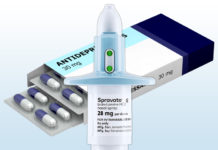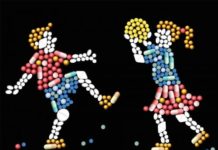The BBC, Harrow, and a Public Left in the Dark
The recent report by the BBC on medication-free treatment in Norway, when viewed in conjunction with the media silence on Martin Harrow's latest publication, reveals why the public remains misinformed about the long-term effects of antipsychotics.
Recovery Rate Six Times Higher For Those Who Stop Antipsychotics Within Two Years
People with "serious mental illness" who stop taking antipsychotics are more likely to recover, even when accounting for baseline severity.
Online Experts on Withdrawal
Online communities are stepping in to help people facing withdrawal effects amass information and receive support for their withdrawal experiences.
Researchers Document Protracted Withdrawal from Antidepressants
Protracted Withdrawal Syndrome characterized by long-term adverse experiences after coming off of antidepressants.
New Research Questions Safety of Esketamine for Depression
An analysis of FDA adverse event reports related to esketamine shows the potential for negative effects such as suicidal and self-injurious ideation.
Researchers: “Antidepressants Should Be Avoided in Bipolar Depression”
New research finds that antidepressants are not effective for bipolar disorder and can worsen symptoms of mania.
Facebook Groups Provide Psychiatric Drug Withdrawal Help When Doctors Don’t
A new study looks at how online communities provide information and support for patients experiencing psychiatric drug withdrawal.
Listening to the Patient Voice: The Antidepressant Withdrawal Experience
Patient advocates join with researchers and service users to present first-hand experiences of antidepressant withdrawal.
Literally Indescribable: Are Antidepressants Addictive?
“My life was very, very good.” That’s how Michael sums up how things were for him—prior to his suffering from devastating withdrawal effects after discontinuing GlaxoSmithKline’s blockbuster drug Paxil.
New FDA Study Shows Benzodiazepines Can Cause Long-Term Injury
The FDA has finally acknowledged the adverse effects of benzodiazepines, the dangers of withdrawal, and that the current packaging does not sufficiently warn of these harms.
Suicide Rates Did Not Decrease When Antidepressant Drugs Were Introduced
Researchers investigate the claim that the introduction of antidepressant drugs led to decreases in suicide rates internationally.
A Short History of Tardive Dyskinesia: 65 Years of Drug-Induced Brain Damage That Rolls...
Psychiatry has long turned a blind eye to the full scope of harm associated with TD. New TD drugs "work" by further impairing brain function.
Increasing Numbers of Children Prescribed Multiple Psychiatric Medications
According to researchers, children are being increasingly prescribed multiple different psychiatric medications.
The Latest “Breakthrough Therapy”: Expensive New Drugs for Tardive Dyskinesia
The increased prescribing of antipsychotics, which frequently cause a brain injury that manifests as tardive dyskinesia, has provided pharmaceutical companies with a lucrative new market opportunity.
Promising Preliminary Results from a Small Study of Psilocybin-Assisted Therapy
A new study offers promising results for psilocybin-assisted psychotherapy for depression.
Researchers: Antidepressant Use in Children Increases Suicide, No Evidence of Benefit
Noted antidepressant researcher, Michael Hengartner, summarizes the latest research on the use of antidepressants in children and adolescents.
Surviving Antidepressants: An Interview with Adele Framer
That is the truth about withdrawal syndrome: It’s like a 50-50 chance that you’re going to have a problem. If you’re in the unlucky half, you’re gonna be really unlucky.
Anticholinergic Drugs Increase Risk of Cognitive Decline
A new study finds that anticholinergic drugs, like antidepressants and antipsychotics, are associated with mild cognitive decline.
Researchers: It’s Time to Stop Recommending Antidepressants for Depression
Researchers review a new synthesis of the existing evidence and conclude that the harms of antidepressants outweigh any benefits.
Antipsychotic Augmentation Increases Risk of Death
A new study finds that adding an antipsychotic to existing antidepressant treatment is associated with a 45% increased risk of early death.
Greater Exposure to Antipsychotics Associated with Worse Long-Term Outcomes
A new study finds adverse long-term consequences associated with the increased use of antipsychotics in first-episode psychosis.
Psychiatry’s Top Experts Acknowledge Lasting Harms of Antidepressant Withdrawal
Royal College of Psychiatrists’ former president demands support for patients coming off antidepressants.
Further Results Confirm Antidepressants Increase Risk of Violent Crime By 26%
Taking an SSRI antidepressant was associated with a 26% increased risk of violent crime conviction.
Unblinding in Antidepressant Trials Biases Results
Studies that compare the effectiveness of different antidepressant drugs are unreliable, according to new research in BMC Psychiatry.
Stuart Shipko – SSRI Withdrawal: Shooting the Odds
We interview Dr. Stuart Shipko, a psychiatrist and author who has a particular interest in the side effects and withdrawal effects of SSRI antidepressants and the need for informed consent when prescribing.

































